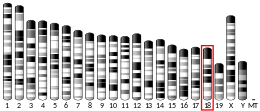This gene encodes a bipartite protein with distinct amino- and carboxy-terminal domains. The amino-terminus contains nuclear localization signals and the carboxy-terminus contains numerous consecutive sequences with extensive similarity to proteins in the gelsolin family of actin-binding proteins, which cap, nucleate, and/or sever actin filaments.[ 7] [ 6]
^ a b c GRCh38: Ensembl release 89: ENSG00000197321 – Ensembl , May 2017^ a b c GRCm38: Ensembl release 89: ENSMUSG00000024236 – Ensembl , May 2017^ "Human PubMed Reference:" . National Center for Biotechnology Information, U.S. National Library of Medicine .^ "Mouse PubMed Reference:" . National Center for Biotechnology Information, U.S. National Library of Medicine .^ Pestonjamasp KN, Pope RK, Wulfkuhle JD, Luna EJ (Dec 1997). "Supervillin (p205): A novel membrane-associated, F-actin-binding protein in the villin/gelsolin superfamily" . The Journal of Cell Biology . 139 (5): 1255–69. doi :10.1083/jcb.139.5.1255 . PMC 2140202 PMID 9382871 . ^ a b "Entrez Gene: SVIL supervillin" .^ Ghoshdastider U, Popp D, Burtnick LD, Robinson RC (Nov 2013). "The expanding superfamily of gelsolin homology domain proteins". Cytoskeleton . 70 (11): 775–95. doi :10.1002/cm.21149 . PMID 24155256 . S2CID 205643538 . ^ Ting HJ, Yeh S, Nishimura K, Chang C (Jan 2002). "Supervillin associates with androgen receptor and modulates its transcriptional activity" . Proceedings of the National Academy of Sciences of the United States of America . 99 (2): 661–6. Bibcode :2002PNAS...99..661T . doi :10.1073/pnas.022469899 PMC 117362 PMID 11792840 .
Pope RK, Pestonjamasp KN, Smith KP, Wulfkuhle JD, Strassel CP, Lawrence JB, Luna EJ (Sep 1998). "Cloning, characterization, and chromosomal localization of human supervillin (SVIL)". Genomics . 52 (3): 342–51. doi :10.1006/geno.1998.5466 . PMID 9867483 . Wulfkuhle JD, Donina IE, Stark NH, Pope RK, Pestonjamasp KN, Niswonger ML, Luna EJ (Jul 1999). "Domain analysis of supervillin, an F-actin bundling plasma membrane protein with functional nuclear localization signals" . Journal of Cell Science . 112 ( Pt 13) (13): 2125–36. doi :10.1242/jcs.112.13.2125 . PMID 10362542 . Kim M, Jiang LH, Wilson HL, North RA, Surprenant A (Nov 2001). "Proteomic and functional evidence for a P2X7 receptor signalling complex" . The EMBO Journal . 20 (22): 6347–58. doi :10.1093/emboj/20.22.6347 . PMC 125721 PMID 11707406 . Ting HJ, Yeh S, Nishimura K, Chang C (Jan 2002). "Supervillin associates with androgen receptor and modulates its transcriptional activity" . Proceedings of the National Academy of Sciences of the United States of America . 99 (2): 661–6. Bibcode :2002PNAS...99..661T . doi :10.1073/pnas.022469899 PMC 117362 PMID 11792840 . Oh SW, Pope RK, Smith KP, Crowley JL, Nebl T, Lawrence JB, Luna EJ (Jun 2003). "Archvillin, a muscle-specific isoform of supervillin, is an early expressed component of the costameric membrane skeleton" . Journal of Cell Science . 116 (Pt 11): 2261–75. doi :10.1242/jcs.00422 hdl :2022/26449 PMID 12711699 . Chen Y, Takizawa N, Crowley JL, Oh SW, Gatto CL, Kambara T, Sato O, Li XD, Ikebe M, Luna EJ (Nov 2003). "F-actin and myosin II binding domains in supervillin" . The Journal of Biological Chemistry . 278 (46): 46094–106. doi :10.1074/jbc.M305311200 PMID 12917436 . Beausoleil SA, Jedrychowski M, Schwartz D, Elias JE, Villén J, Li J, Cohn MA, Cantley LC, Gygi SP (Aug 2004). "Large-scale characterization of HeLa cell nuclear phosphoproteins" . Proceedings of the National Academy of Sciences of the United States of America . 101 (33): 12130–5. Bibcode :2004PNAS..10112130B . doi :10.1073/pnas.0404720101 PMC 514446 PMID 15302935 . Jin J, Smith FD, Stark C, Wells CD, Fawcett JP, Kulkarni S, Metalnikov P, O'Donnell P, Taylor P, Taylor L, Zougman A, Woodgett JR, Langeberg LK, Scott JD, Pawson T (Aug 2004). "Proteomic, functional, and domain-based analysis of in vivo 14-3-3 binding proteins involved in cytoskeletal regulation and cellular organization" . Current Biology . 14 (16): 1436–50. doi :10.1016/j.cub.2004.07.051 PMID 15324660 . S2CID 2371325 . Olsen JV, Blagoev B, Gnad F, Macek B, Kumar C, Mortensen P, Mann M (Nov 2006). "Global, in vivo, and site-specific phosphorylation dynamics in signaling networks" . Cell . 127 (3): 635–48. doi :10.1016/j.cell.2006.09.026 PMID 17081983 . S2CID 7827573 .






